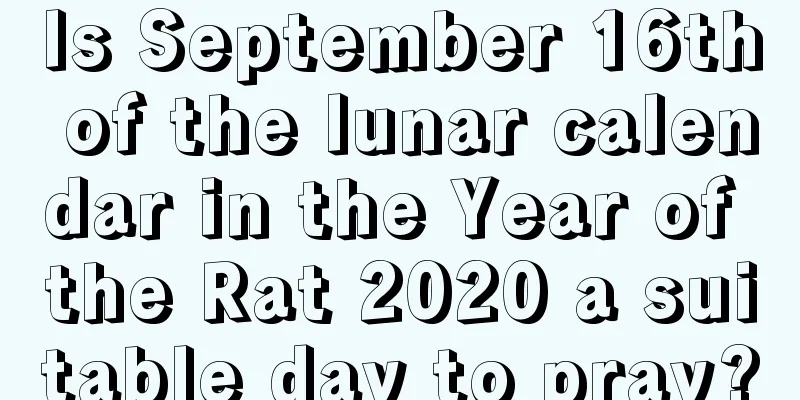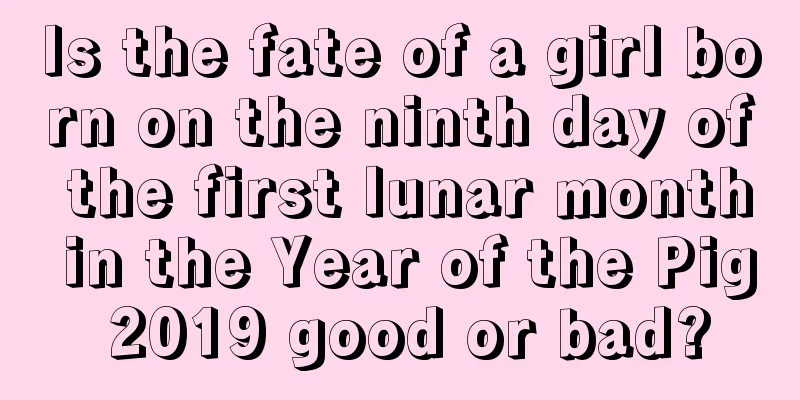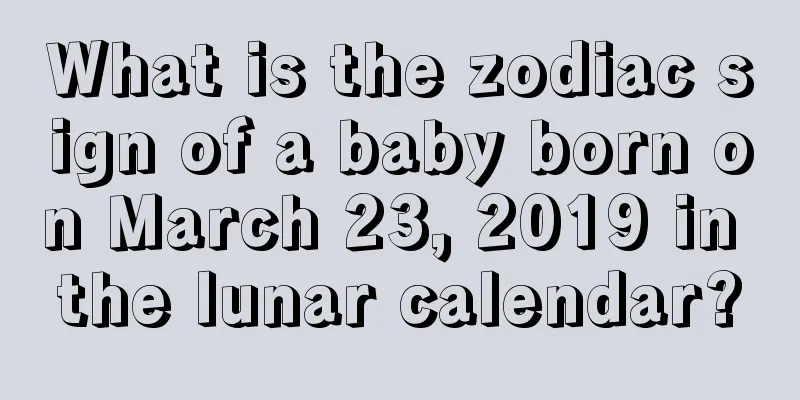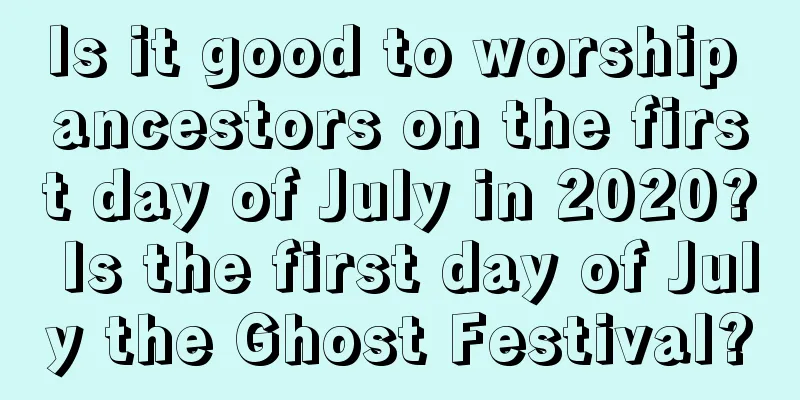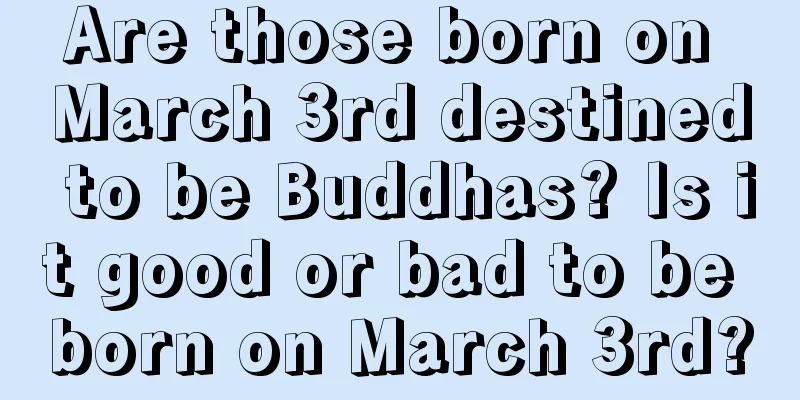What is the solar term Jingzhe? Are there any customs during Jingzhe?

Introduction: Jingzhe is one of the 24 solar terms, and the arrival of Jingzhe indicates that spring has completely arrived. There are also many customs and habits related to Jingzhe. So what is the solar term Jingzhe? Are there any customs during the Jingzhe Festival? If you want to know more about the first month of the lunar calendar in 2018, please pay attention to our fortune teller website!What is the solar term Jingzhe?Jingzhe, formerly known as "Qizhe", is the third solar term in the 24 solar terms of the lunar calendar, marking the beginning of mid-spring; when the sun reaches 345° of the ecliptic longitude. "Collected Explanations of the 72 Seasonal Changes in the Lunar Calendar" states: "The second month is the season when all things emerge from the shock of thunder. Thunder is the beginning of the year, so it is called the Waking of Insects, because hibernating insects are startled and flee."Before this, animals hibernate in the ground during the winter, without eating or drinking, which is called "hibernation"; when the "Qingzhe Festival" comes, the spring thunder in the sky awakens the hibernating animals, which is called "startling". Therefore, during the Jingzhe Festival, hibernating insects wake up, the weather turns warmer, spring thunder gradually appears, and most parts of China enter the spring farming season. In ancient times, the Waking of Insects was divided into three stages: "The first stage is the beginning of peach blossoms; the second stage is the singing of orioles; the third stage is the transformation of eagles into doves." The flower signals represented by the three stages of the Waking of Insects are: "The first stage is peach blossoms, the second stage is apricot blossoms, and the third stage is roses." Are there any customs during the Jingzhe Festival?Eating pears during the Waking of Insects <br /> There is a folk custom of "eating pears during the Waking of Insects". There is no trace as to when the custom of eating pears during the Waking of Insects season originated, but the people of Qi County have such a story that has been passed down from generation to generation. Legend has it that the Qu family, a well-known Shanxi merchant family, was descended from Qu Ji, a native of Changzi County, Shangdang. In the early years of Hongwu in the Ming Dynasty, he brought his two sons, Xin and Yi, and traded Shangdang's Lu hemp and pears for Qi County's coarse cloth and red dates. He traveled back and forth between the two places to make a profit. Over time, he saved some money and settled down in Qi County.Jingzhe beats the villain <br /> Jingzhe symbolizes the beginning of February. There will be a thunderclap that awakens all hibernating snakes, insects, rats and ants. According to the folk custom of Jingzhe, the insects and ants in the house will respond to the thunder and look for food everywhere. Therefore, in ancient times, on the day of Jingzhe, people would hold fragrant incense and mugwort and fumigate the four corners of their homes to use the fragrance to drive away snakes, insects, mosquitoes, rats and musty smells. Over time, this gradually evolved into a habit of those who were unhappy slapping their opponents and driving away bad luck, which is the predecessor of "beating the villain". Therefore, an interesting scene would appear on the Waking of Insects day every year: a woman would hit a paper doll with a wooden slipper while chanting a spell to beat the paper doll: "I'll hit your head until you are so angry that you tremble, and I'll hit you until you vomit even if you eat your relatives." Waking of Insects Day: Offering sacrifices to the White Tiger <br /> The ancients regarded the White Tiger as the king of beasts, able to drive away evil and harm. Every year on the Waking of Insects Day, people offered sacrifices to the White Tiger to drive away all insects and protect themselves from pests. At the same time, among the twelve zodiac signs, some of them will be affected by the White Tiger and Heavenly Dog evil spirits. Later, it gradually evolved into the zodiac signs that offend the White Tiger and Heavenly Dog, or people who feel unlucky and have been offended by villains will worship the White Tiger on the Waking of Insects Day, praying for a peaceful and smooth year and to drive away villains and diseases. The so-called white tiger sacrifice refers to the worship of a white tiger drawn on paper. The paper tiger is usually yellow with black stripes, and has a pair of fangs painted at the corners of its mouth. Then you can hit it. Jingzhe Festival: Worship the Thunder God <br /> The solar term god of Jingzhe Festival is the Thunder God. As the god of the nine heavens, Leishen has a lofty status. There is a saying among Hakka people in various places: "Thunder God in the sky and uncle in the earth." On the one hand, this saying points out the prominent position of uncle in the family, and on the other hand, it also implies that Thunder God is an important god in heaven after Heaven God. In Taiwan, the solar term god of Jingzhe is "Leigong". According to legend, "Thunder God" is a big bird that carries an iron hammer with him at all times. It is he who uses the iron hammer to create rumbling thunder, awakening all things on earth, and people know that spring has come. Hakka people stir-fry insects <br /> The custom of driving away, killing and eating insects on the Waking of Insects Day has a very ancient origin. Many ethnic minorities still retain traditions similar to the Hakka "stir-fried insects". The Hakka people use the method of "frying insects" to achieve the utilitarian purpose of repelling insects. On the day of Jingzhe, the Hakka people in the ancient Tingzhou area of western Fujian would boil taro with the skin on in hot water, or fry beans or rice. People believe that this can kill many kinds of small insects, hence the saying "fry insects and fry beasts, kill (boil) insects and kill beasts." Jingzhe is the time when hibernating insects begin to revive, so the Hakka ancestors advocated early insect control. On the Waking of Insects Day, the Hakka people in Tingzhou have the custom of making taro cakes or taro dumplings. Taro symbolizes "caterpillars" and eating taro means getting rid of all insects. Summary: The above content is about [What is the solar term Jingzhe? Are there any customs during Jingzhe? 】Problem analysis, hope it can help everyone! |
>>: When is the Waking of Insects in 2018? What are the taboos and precautions during Jingzhe?
Recommend
Is it a good idea to move house on May 28th of the lunar calendar in 2019?
Chinese people believe that the fifth month of th...
Is it possible to get engaged during the Great Cold? Is it a good idea to get engaged during the Great Cold in 2019?
An ancient poem says, "The wax trees and silv...
Is it a good idea to get married or engaged on July 14, 2018 in the lunar calendar?
The seventh month of the lunar calendar is full o...
Is the third day of the fifth lunar month in 2022 a day of underworld? Is the opening going well?
The lunar calendar days can be divided into unluck...
Is it good for a baby chicken born in the twelfth month of the lunar calendar? Which month is best for people born in the Year of the Rooster?
People born in the Year of the Rooster love to dre...
Can I get engaged on the day of Grain in Ear in 2020? Does the luck change in the nine days after Grain in Ear include that day?
Introduction: Generally, an auspicious day is requ...
Are people born on National Day in the Year of the Pig lucky and have good fortune?
Everyone has his own destiny. What is the fate of ...
Is it okay to get the marriage certificate the day before Qingming Festival in 2020? Can’t I go back to my parents’ home during Qingming Festival?
Introduction: Generally speaking, according to tra...
Is it a good idea to sign the contract on November 19th of the lunar calendar in 2020? Is the hexagram a good sign?
An old saying goes: "If you can't find a ...
Is the third day of the eleventh lunar month in 2018 suitable for travel? Is it a good day to travel?
Introduction: According to the tradition of our co...
When is Chinese Valentine's Day this year? When did the name Qixi Festival appear?
Qixi Festival falls on the seventh day of the seve...
Where is the God of Happiness on December 22, 2017?
The Fortune Teller website has prepared a large a...
Is the fate of a female dog born on the fifth day of the third lunar month in 2018 good? What is her personality like?
Introduction:-It is the time of revival again, and...
Is it suitable to pick up the car on February 5, 2018?
A new car means a new journey and it requires saf...
What does the 24 solar terms Cold Dew mean? What is the exact time of Cold Dew in 2020?
Cold Dew is the fifth solar term in autumn. The te...
